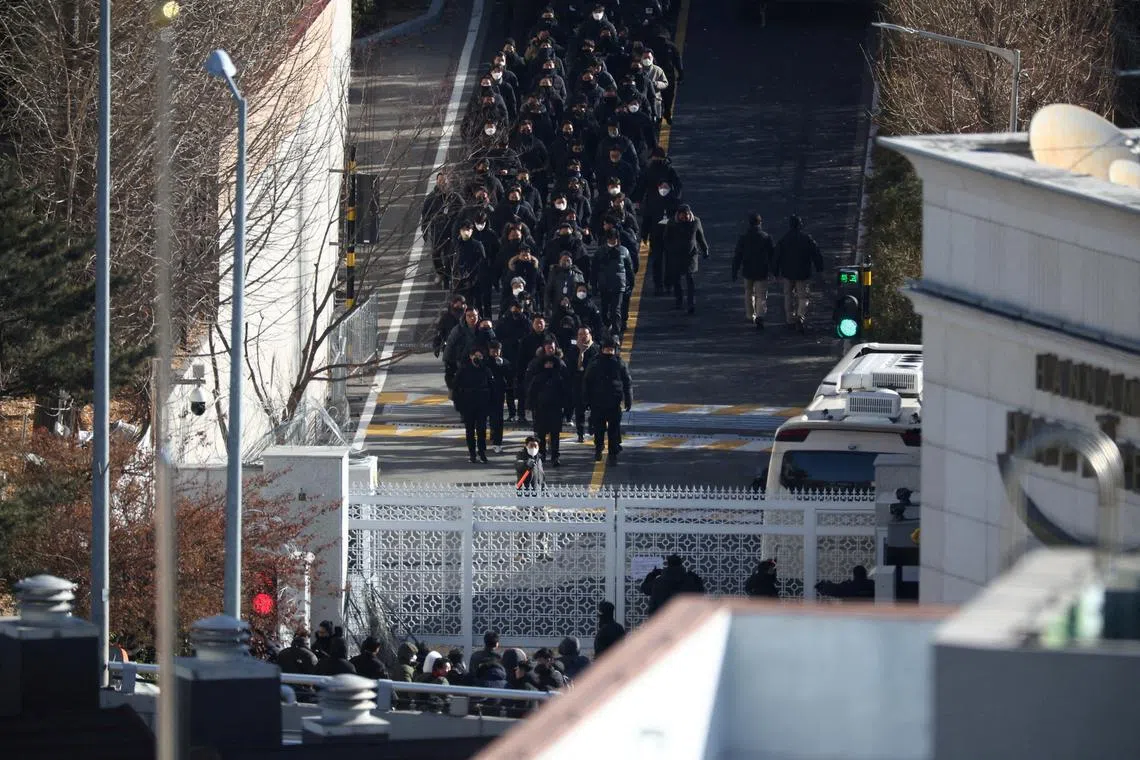‘It starts now’: South Korea’s President Yoon defiant as police closed in
Sign up now: Get insights on Asia's fast-moving developments

Many Yoon supporters draw parallels between his plight and that of US President-elect Donald Trump.
PHOTO: REUTERS
Follow topic:
SEOUL - As 3,000 riot police swarmed his hillside villa on Wednesday, South Korean President Yoon Suk Yeol huddled with party loyalists, telling them that people were increasingly realising the country’s legal system had been hijacked by leftist forces.
“People are now seeing how serious the situation is,” the impeached president told the gathering, according to one lawmaker present, Mr Yoon Sang-hyun.
“It starts now,” the 64-year-old leader said, according to another lawmaker, Mr Kwon Young-jin.
Mr Yoon cited the support of thousands who have taken to the streets to defend him since he was impeached by Parliament over his short-lived Dec 3 martial law decree
Hours later, Mr Yoon, a former prosecutor, ended a weeks-long stand-off and became the country’s first sitting president to be arrested
His unsubstantiated assertions about South Korea’s compromised institutions are not new. They are among several grounds he cited, without evidence, to justify his martial law decree, which plunged one of Asia’s most vibrant democracies into unprecedented political turmoil.
But the accounts of his final impassioned plea, some of which have not previously been reported, suggest Mr Yoon senses his support is swelling and sees a glimmer of hope for his presidency.
He remained in detention on Jan 17 and was refusing to talk to investigators. Apart from the criminal probe, he faces an impeachment trial in the Constitutional Court, which will decide whether to restore his presidential powers or remove him from office.
His lawyers did not immediately respond to a request for comment for this article.
Support for Mr Yoon’s conservative People Power Party collapsed after his martial law declaration, which he rescinded hours later in the face of a unanimous vote in Parliament rejecting it.
But in the turmoil since – in which the opposition-majority Parliament impeached his first replacement and investigators botched an initial attempt to arrest Mr Yoon – the PPP’s support has sharply rebounded.
His party has edged ahead of the opposition Democratic Party, 39 to 36 per cent, for the first time since August, a Gallup Korea poll showed on Jan 17.
It is hard to determine how much of the PPP’s bounce represents sympathy for Mr Yoon and how much could be broader frustration at the subsequent chaos, as Gallup Korea and most other pollsters have stopped surveying Mr Yoon’s personal ratings.
Jan 17’s poll showed that 57 per cent still support his removal from office, and anti-Yoon demonstrators also still regularly gather in large numbers.
Mr Yoon and his party’s constant messaging to supporters appeared to have had an impact when political divisions over his arrest deepened, Gallup Korea said, explaining the PPP’s resurgence.
As his mostly older supporters protest, some waving American as well as South Korean flags and “Stop the Steal” banners, right-wing YouTubers promote his assertions, including that election hacking contributed to the opposition’s landslide win in a ballot last year.
Many Yoon supporters draw parallels between his plight and that of US President-elect Donald Trump, who argued voter fraud contributed to his election defeat in 2020 and that his host of legal troubles were politically motivated. Trump too has not provided evidence for such claims, and dozens of court cases challenging his loss failed.
Mr Jun Kwang-hoon, an evangelical pastor behind many of the pro-Yoon demonstrations, said he would attend Trump’s inauguration on Jan 20 and plans to speak to him about election fraud in South Korea. Representatives for Trump declined to comment.
North-east Asia analyst at political risk consultancy Eurasia Group Jeremy Chan said Mr Yoon’s defiance in the face of extreme adversity also has parallels with Trump. “He looks like he’s digging in his heels maximally, just like Trump would do,” Mr Chan said.
The question is whether Mr Yoon has any chance of making a Trump-like political comeback.
A court on Jan 16 denied a challenge by Mr Yoon’s lawyers, who argued his arrest is illegal because the warrant was issued in the wrong jurisdiction and the investigating team had no mandate for their probe. His lawyers also lost a request to exclude one of the Constitutional Court’s new justices from the impeachment trial on the grounds that Mr Yoon could not get a fair hearing before the opposition-nominated jurist.
Eurasia Group’s Mr Chan sees little chance of a Yoon comeback because he said there is not likely to be a broad national rethink of the legitimacy of Yoon’s declaration of martial law – an act Mr Chan called “verging on political suicide”.
That has not deterred Yoon loyalists.
Another PPP lawmaker, Mr Lee Sang-hwi, who met Mr Yoon in his compound just before his arrest, said the embattled president had prepared ham sandwiches for his visitors. Some wept and bowed as he revealed he would submit to investigators only to avoid violence.
Citing the party’s ratings recovery, Mr Lee expressed hope that more people will come to Mr Yoon’s side.
“People have common sense,” he said. “What is happening now goes against common sense.” REUTERS

